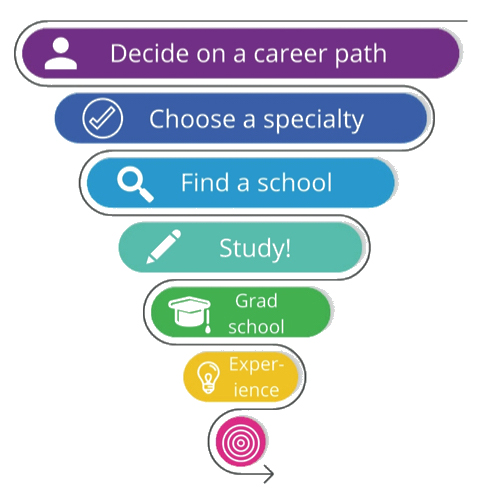How to Become a Psychologist: A Student’s Guide
- May 26, 2016
- Posted by: Administrator
- Category: Career Guides, Student Resources,

Embarking on Your Psychology Career
In Seven EASY Steps
You’ve thought about it a lot, you’ve mulled over the pros and cons, and you’ve finally come to a decision — you want to become a psychologist.
But before you can build a career in this fascinating field, you’ll probably be staring at one BIG question: how do you get started? There’s more to becoming a psychologist than simply picking psychology as your college major.
No, it won’t be an easy task, but the rewards are well worth the hard work!
This article outlines the seven basic steps you’ll need to follow to begin pursuing your dream career in psychology and will help you begin to sort through your options so you can get yourself started on the right career path.

Sponsored School(s)
1. Decide on a Career Path
Consider What Sort of Psychologist You Want to Be
There are many positions available for psychologists, with each requiring a different set of skills. Would you rather be a clinical psychologist, who might work on fields as diverse as research, counseling, and psychological assessment; a psychiatrist, a physician who can prescribe medications in conjunction with counseling; or a therapist, who helps people overcome their psychological issues? The goal you choose will determine your path.
A clinical psychologist, for example, will have heavy training in both the theory and practice of psychology. You’ll typically need a doctorate degree in a psychology-related field in order to build a career. A psychiatrist has even more rigorous demands; becoming one requires medical school training.
A therapist, on the other hand, can often get by with a masters degree in their chosen specialty. However, most therapists will agree that doctorate-level training can go a long way in your success.

2. Choose Your Specialty
 Once you’ve decided what you want to become, you’ve then got to choose your specialty. Psychology is a science that branches out into many other specializations, and you’ve got to decide which of those you’d want to build your career around.
Once you’ve decided what you want to become, you’ve then got to choose your specialty. Psychology is a science that branches out into many other specializations, and you’ve got to decide which of those you’d want to build your career around.
For example, a clinical psychologist may choose to focus on psychological research, and so they might opt to make Experimental Psychology or Behavioral Analysis their specialty.
A psychiatrist who prefers to work with children and teenagers might enter child or adolescent psychiatry, while a psychiatrist who prefers to work with the elderly could become a geropsychiatrist. A therapist has a host of choices; they can choose to enter family therapy, relationship counseling, or addiction counseling, among many others.
3. Find a School
 Once you’ve determined what sort of track you want to take, it’s time to start scouting around for a college. Location, budget, and faculty are among the essential factors to consider.
Once you’ve determined what sort of track you want to take, it’s time to start scouting around for a college. Location, budget, and faculty are among the essential factors to consider.
Perhaps the most important (and most basic) thing to check for is if whether or not the school offers a bachelor’s degree in the program of your choice, and whether or not it’s accredited by a reputable institution. Most universities offer undergraduate psychology degrees; just be sure the school is accredited.
4. Study, Study, Study
 If you ever want to succeed as a psychologist, you’ve got to know your stuff. Since the current trend with psychology is integration of multiple branches to provide a complete, holistic understanding of the human experience, you’ll need a solid background on a range of topics.
If you ever want to succeed as a psychologist, you’ve got to know your stuff. Since the current trend with psychology is integration of multiple branches to provide a complete, holistic understanding of the human experience, you’ll need a solid background on a range of topics.
Your performance in school will determine your options after graduation, so take your studies very seriously.
5. Go to Graduate School
 The work isn’t over yet. After college, you’ll need to continue your studies. Find out what graduate programs are available and/or required for the field you want to enter. Most fields require a master’s degree, although doctorates are often necessary for clinical psychologists, and medical degrees are typically required if you want to be a psychiatrist.
The work isn’t over yet. After college, you’ll need to continue your studies. Find out what graduate programs are available and/or required for the field you want to enter. Most fields require a master’s degree, although doctorates are often necessary for clinical psychologists, and medical degrees are typically required if you want to be a psychiatrist.
Success in grad school requires the same focus as you put in as an undergraduate, but at an even more advanced level. So study, study, study.
6. Get Experience
 No form of education is better than actual experience, so go out there and get some work in! Although most clinical programs will require you to complete an internship program anyway, you can always supplement it with a little extra experience.
No form of education is better than actual experience, so go out there and get some work in! Although most clinical programs will require you to complete an internship program anyway, you can always supplement it with a little extra experience.
You can sign up to be a research assistant or volunteer where social workers are needed, among others. If you’re feeling brave, you can also sign up for another supplementary internship. Just make sure your programs are accredited.
7. Pass the Licensure Exam
 The last thing you need to do to become a full-fledged psychologist is to get licensed. It is a law that psychologists can only legally practice if they possess a license to do so, much like doctors do. In order to do this, you have to do three things:
The last thing you need to do to become a full-fledged psychologist is to get licensed. It is a law that psychologists can only legally practice if they possess a license to do so, much like doctors do. In order to do this, you have to do three things:
1) Get work experience under the supervision of a licensed professional (usually for two years); 2) Pass the board exams; and 3) Depending on your state, present a valid case study to the board. After all that work, you’ll finally be able to call yourself a psychologist!







